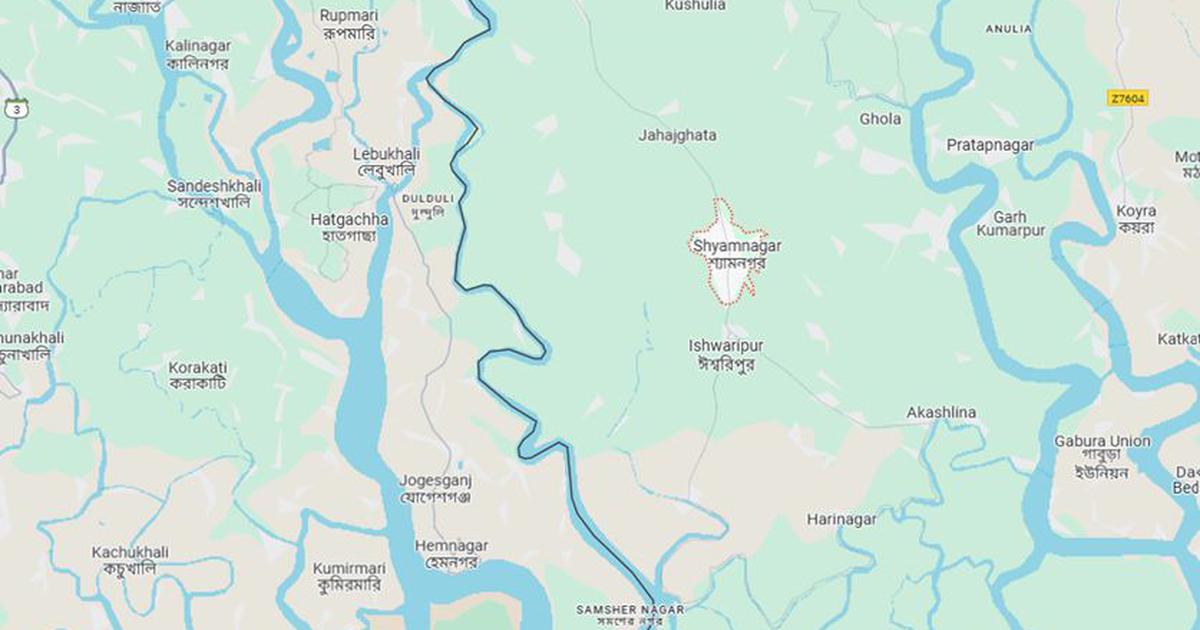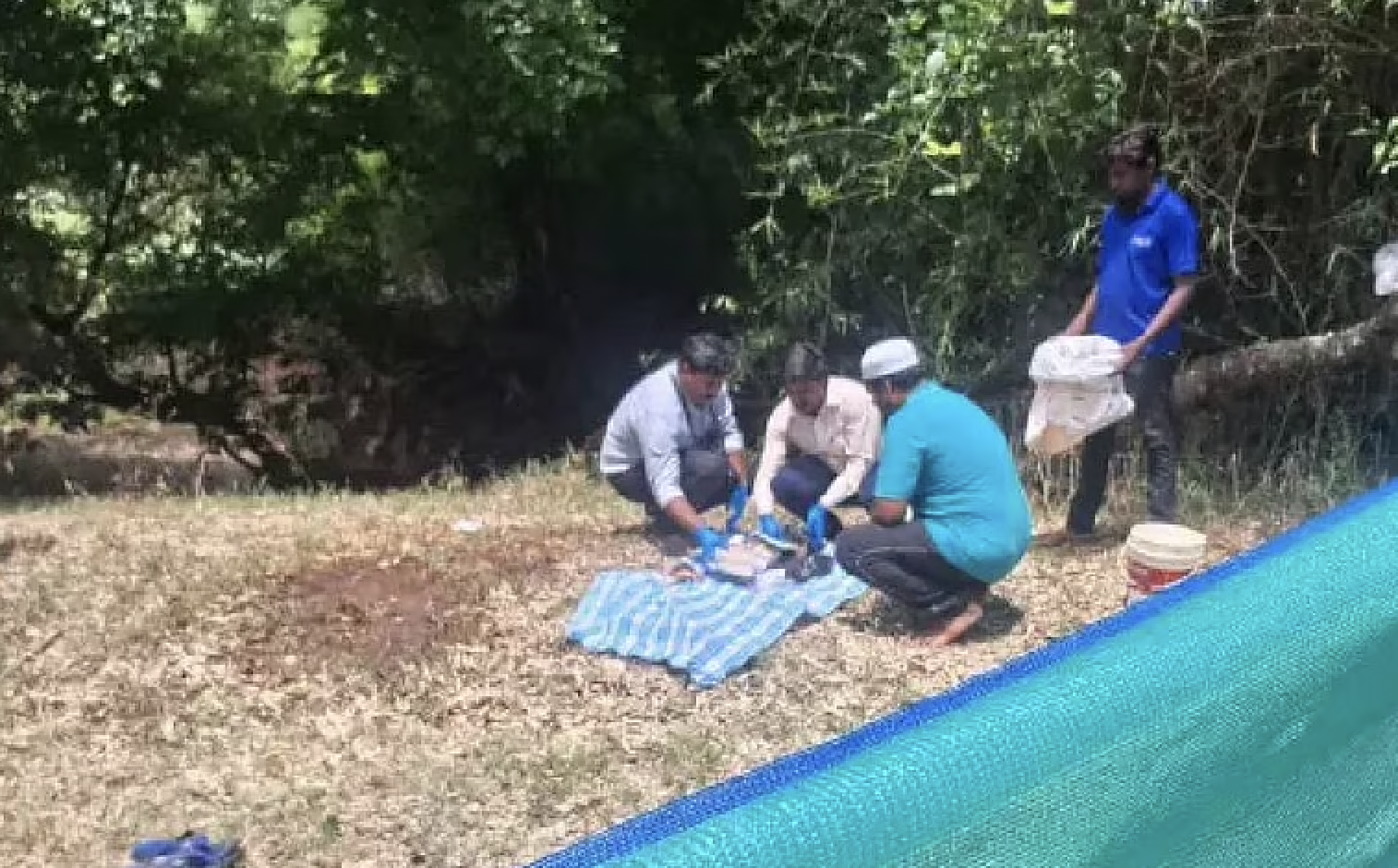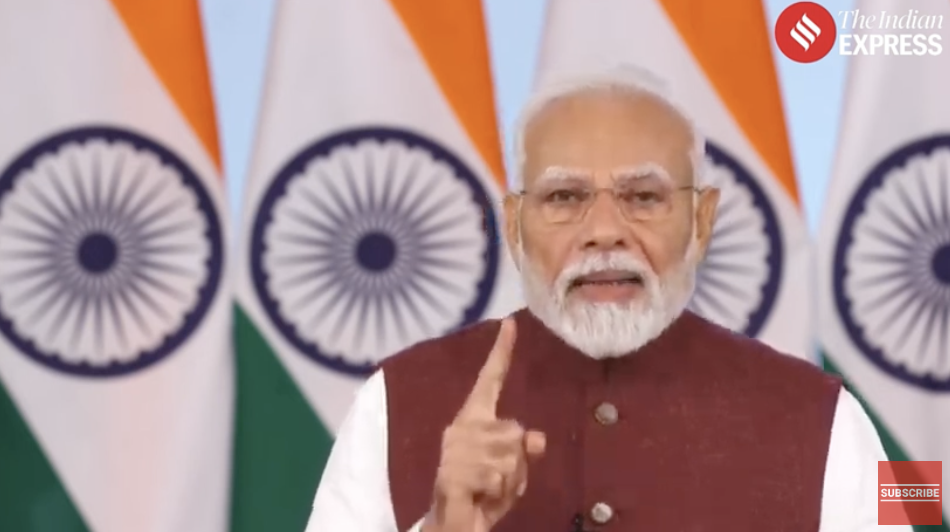With a tearful speech delivered on the live television, Rakesh Tikait overturned the fate of the farmers protest at the Ghazipur site on Delhi and Uttar Pradesh’s border. On the evening of 28 January, Rakesh, the national spokesperson of the Bharatiya Kisan Union’s Arajnaitik faction in western Uttar Pradesh, refused to vacate the farmers’ protest site at Delhi’s Ghazipur border. A few hours earlier, there had been a huge build-up of police and security forces at the site. Rakesh and other farmer leaders had been served a notice by the local administration, which directed them to clear the site. The government earlier shut off water and electricity supply to the site.
Rakesh and the members of the union, which is based primarily in western Uttar Pradesh, had been camped at Delhi’s Ghazipur border for over seven weeks, in protest again the farm laws recently enacted by the ruling BJP. He was a part of the farmers contingent that held several rounds of talks with the government regarding the protesters demands. Rakesh had also been named, along with several other farmer leaders, in a first-information report filed by the Delhi Police related to violence that unfolded during the tractor rally on 26 January.
On the evening of 28 January, mainstream channels had arrived to document what they predicted was the end of the Ghazipur protest and to speak to Rakesh, the most prominent face there. But when the police came up to the stage, Rakesh refused arrest. A short while later, in an emotional outburst, he appealed for the protest to endure and said that “the Bharatiya Janata Party’s people are conspiring to kill the farmers.” With tears streaming down his face, Rakesh said that he would rather die than end his protest. Referring to the water shutdown, he resolved to not drink water unless it was brought from his village.
His teary appeal went viral. As soon as farmers in Haryana and Uttar Pradesh learnt of it from the news and social media, people began to leave in droves for the Ghazipur site. Meetings started in the night in various villages to discuss plans of departure. Farmers from Sisauli, Tikait’s hometown, arrived that same night. In other parts of the the state, farmers with filled tractor trolleys left for Ghazipur, aiming to arrive by morning. “Rakesh Tikait’s tears have hurt the hearts of every Indian farmer … this crowd will keep increasing,” Dal Chand, a farmer who arrived at Ghazipur that night from Bijnor in Uttar Pradesh, told The Caravan. By 4 am the next morning, thousands more had reached.
The next day, mahapanchayats—town-hall meetings—from Haryana and Uttar Pradesh started mobilising to send farmers to the site. The BKU (A) also held a mahapanchayat in its stronghold of Muzaffarnagar in Uttar Pradesh, attended by thousands. Naresh Tikait, Rakesh’s elder brother and the official head of the BKU (A), gave a call for the protests to continue.
By that evening, the Ghazipur site had transformed. According to media reports, it swelled to about ten thousand farmers. Media reports credited Rakesh’s speech with the turning around, crowning him the new most prominent of the farmer agitation. Comparisons were rife between Rakesh and his father, Mahender Singh Tikait, a legend among the farming community in north India.
Rakesh’s growing influence in the farmers’ protest is a surprise to anyone who has followed his career until now. Until the movement against the agri-reforms began, his credibility as a farmer leader was overshadowed by his previous alliances with the BJP—he and his brother, Naresh Tikait, the president of the BKU, were vocal supporters of Hindutva politics and the BJP’s policies. Both the brothers were named in first information reports, along with BJP leaders, filed after the 2013 Muzaffarnagar riots, for inciting communal hatred. The BKU and the BJP had actively participated in a mahapanchayat on 7 September that year, which eventually culminated in the riots. Rakesh’s affiliation with the BJP went back further—he had previously tried to contest general election in 2009 on a BJP ticket, which was in alliance with the Rashtriya Lok Dal at the time. The alliance fell through. In fact, between 2004 and 2014, Rakesh contested assembly and parliamentary elections in Uttar Pradesh in alliance with several political parties but never won.
Journalists and farmer leaders I spoke to told me that Rakesh’s political ambitions had stunted his influence among the farming community. Despite the legacy of Mahendra and BKU, Rakesh never enjoyed the popularity and influence of his father among the farming community of western Uttar Pradesh. Ghulam Mohammad Jola, a senior farmer leader who used to be Mahender Tikait’s close aide, said, “The universal appeal of the union is gone. Rakesh goes on stage with Rajnath Singh”—the defense minister in the Narendra Modi cabinet. But with Rakesh Tikait mounting an open challenge now to the Modi government’s farm laws, thousands of farmers behind him, it appears that his legacy may yet change.
Rakesh’s father, Mahendra, was one of the founding members of the Bharatiya Kisan Union, historically a non-partisan farmer’s organisation. One of its earliest iterations was first formed in 1978 under the leadership of Chaudhury Charan Singh, a former prime minister and a famous farmer leader, in association with Charan Singh’s political outfit, the Bharatiya Lok Dal. It was reorganised in 1986, under Mahendra, as a non-partisan group. Mahendra lead several farmers’ movements that consolidated his position as a foremost farmers leaders—a gherao of the Meerut Commissionerate in January 1988, and a farmers’ seige of Delhi later that year. In 1996, Mahendra allied with Ajit Singh, Charan Singh’s son, who formed the Kisan Kamgar Party. The alliance won 14 seats in that year’s Uttar Pradesh assembly election. The next year, however, Mahendra broke away from the partnership.
According to news reports, Mahendra introduced his younger son Rakesh into the BKU’s work around 1993 to 1994—he had joined the Delhi Police in 1985 and quit the force around 1993. In 1997, after breaking away from the KKP, Mahendra facilitated Rakesh’s formal entry into the BKU and anointed him the national spokesperson of the union.
After Mahendra’s death in 2011, the leadership of the BKU went to Naresh Tikait, Mahendra’s eldest son. According to Ravindra Rana, a journalist, the BKU, which has a federal structure, soon splintered into dozens of factions in Uttar Pradesh, with Naresh and Rakesh heading BKU (Arajnaitik).
Nahar Singh Yadav, another aide of Mahendra and a former president of the BKU’s Pilana block in Uttar Pradesh, said that Rakesh developed a reputation for acting unilaterally, and his political ambitions further eroded the community’s trust in him. Rana, who has covered the BKU for several years, said, “Rakesh has no long-term vision for the farming community.” But “he is doing as much as he can,” Rana added.
In 2004, Rakesh formed the Bahujan Kisan Dal, the poltical wing of the BKU, and the party contested the Lok Sabha elections from nine constituencies in Uttar Pradesh but did not win a single seat. Rakesh did not contest this election. In the 2007 assembly election in Uttar Pradesh, the BKD formed an alliance with the Congress. Rakesh himself unsuccessfuly contested from the Khatauli constituency in western Uttar Pradesh. In the 2009 general election, Rakesh attempted to contest from Bijnor on a BJP ticket, which was then allied with Ajit’s new party, the Rashtriya Lok Dal. However, the BJP-RLD combine did not offer Rakesh a ticket—media reports suggest that Mahendra had decided to provide support to the Congress, and again, Rakesh did not contest the elections that year. In the general election of 2014, Rakesh contested from the Amroha constituency in Uttar Pradesh, this time on a ticket from the RLD, which was then allied with the Congress-led United Progressive Alliance. Rakesh even resigned from the BKU to be able to contest the election. However, he lost that election, too.
Rana told me that Rakesh’s political ambitions took him away from his core constituency. He said that farmers connected better with the senior Tikait because he led a lifestyle similar to theirs. “He used to wear hawai slippers, his dhoti-kurta was the same as everyone else, he slept under the trolley like everyone else, he would eat with everyone,” Rana said. “The farmers did not think of him as a leader but as their man.” But Rakesh was unable to form this sort of connection, Rana said, as he had not spent time among the farmers. “Rakesh’s own political ambitions also came in the way,” he said.
Rana said that, because, Rakesh always had his eye on either the Lok Sabha or the Vidhan Sabha and continued contesting elections, “he could not pay full attention to the farmers and always kept thinking of how to win the election. If he had focused his attention on the farmers, he would have carried forward the legacy of Tikait”—referring to Mahendra. Rakesh did not understand “how to make the interests of farmers a tool,” he said. Rana also faulted Rakesh for allying with political parties of all hues and ideologies.
Given his political ambitions, there has been talk in BJP circles in western Uttar Pradesh that Rakesh is corrupt. Rana, however, was dismissive this. “The role of the government is to spread propaganda … and it is still the easiest thing to do to say that a leader sold out and built up his property.” He added, “It is true that Rakesh built a house in the city of Muzaffarnagar but that is because it is easy to run the farmer movement from there.”
Jola, formerly Mahendra’s aide, attributed Rakesh’s thin support within his father’s base to the BKU’s role in the Muzaffarnagar riots. The 80-year old, who was considered Mahendra’s right-hand man, was a prominent face of the Jat-Muslim combine that formed the core composition of the BKU in western Uttar Pradesh. He condemned the BKU’s actions in the days preceding the Muzaffarnagar riots. “The union did not take a correct stand,” he said.
“There were only two types of people in the union—Jat and Muslims who used to support it. Now, these two communities don’t live together. There has been a complete decline in the union. The BJP only talks caste and creates riots,” Jola said. This affected Rakesh’s appeal among the farming community. “There was a lot of change in Rakesh’s activities after the riots. He did not think like Tikait”—Mahendra. After the riots, Rakesh “got busy in making his own assets,” Jola said. “He also started fraternising with BJP leaders.” This led Jola to forming a new platform for farmer issues, called the Kisan Mazdoor Forum.
Under Mahendra, the BKU’s influence extended across Uttar Pradesh, empowering the rise of several local leaders. “More than 30 unions were formed in the entire state after the death of Mahendra Singh Tikait,” Rana said. But after Mahendra’s death in 2011, Rakesh was unable to fill his father’s shoes. “Rakesh had little experience and all these leaders from Mahendra’s time were still there and they were all equal to Tikait senior”—he named farmer leaders such as Jola and Harpal Singh Bilari, who were much older than Rakesh. “How could Rakesh become the leader with all these men there? Therefore the entire union scattered. And many more unions were formed. At that time there was no leader who could take the place of Tikait or to build that legacy.”
Yadav, who was a president of the union in Baghpat district’s Pilana block, blamed Rakesh’s style of functioning for the union’s splintering. “Flaws started creeping in and people started forming their own organisations.” Yadav served in the Indian Army and was an associate of Mahendra since 1985, when the former had retired. “After Rakesh’s arrival, these problems started increasing. A lot of us got together and made one of our workers a district president; Naresh also agreed to it but Rakesh did not and removed him. That was when we broke away and formed our own organisation.” He said that Rakesh “would do things by himself and not consult other workers.” Yadav, too, said that Rakesh’s constant attempts to win elections also cost him the farming community’s support.
Despite Rakesh’s faltering leadership, Rana said that whatever work the BKU(A) has done since the splintering has only been because of Rakesh. “Whatever happened, Rakesh did it. Despite his lack of experience, he carried it forward. It is a different matter that he has his limitations and he always tries to go into politics.”
Rajveer Singh Jadoun, the unit chief of the BKU(A) in Uttar Pradesh, said that Rakesh’s political ambitions had left him with bitter experiences. Jadoun hails from Jalaun district and has been associated with the union since Mahendra’s time. He told me, “In the initial years, when he joined the union, Rakesh did not understand things well.” Jadoun said that Rakesh’s political experiments had taught him a lesson. According to Jadoun, the 2014 election that Rakesh fought in 2014 on the RLD ticket “was under pressure from people and the community. Even before the results, he declared that he will never contest an election ever again in his life.”
Rana felt that it was not Rakesh alone, but the Tikait family as a whole that had failed to take farmer issues to national level. “There are always farmer movements in India but rarely any long-term solutions … They used to solve any small issues but no big questions,” Rana said. “And this the problem with Rakesh also.”
Jola said that Rakesh had never been able to create and lead movements on the scale that his father did. I had spoken to him before the turn around at Ghazipur. At the time, he seemed uncertain about Tikait’s future beyond the movement. “This movement will last until this government agrees. What after that?”
This article first appeared on caravanmagazine.in






